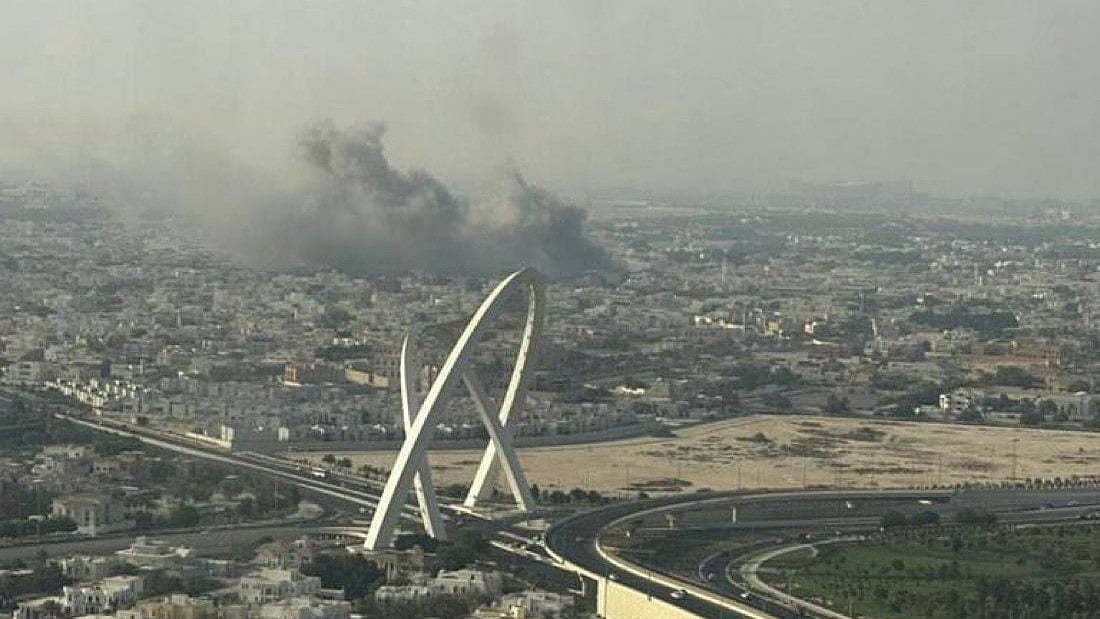World
Israeli strike on Doha meeting stuns Gulf and derails ceasefire talks
Qatar’s faith in its US alliance and Al Udeid defences as a shield against Israel collapsed on Tuesday

Qatar, the tiny but gas-rich Gulf state long regarded as a safe hub for conflict mediation, has been left reeling after an Israeli aerial strike hit a meeting of Hamas’ political leadership in its capital, Doha. The attack, carried out on Tuesday as ceasefire discussions were under way, has sent shockwaves through the Gulf and raised unsettling questions about the security of a close US ally.
Qatar is home to the largest American military base in the Middle East, was designated a US “major non-NATO ally,” and even gifted a USD 400 million jumbo jet to former US President Donald Trump for use as Air Force One. It has also facilitated the evacuation of tens of thousands of American citizens from Afghanistan. Yet none of these ties shielded the country from Israel’s decision to strike in the midst of negotiations.
Plumes of smoke rose above Doha’s skyline which is usually dominated by World Cup stadiums and luxury malls, as Israeli bombs hit the gathering of exiled Hamas figures. While the group later claimed its senior leadership survived, analysts described the move as a dangerous gamble that has poisoned mediation efforts and shaken confidence in established security arrangements.
“This is a broader shock for the international order, raising questions about sovereignty and the free rein being given to Israel,” said Sanam Vakil, director of the Middle East and North Africa Programme at Chatham House. “The reliability of the United States in the Middle East will be questioned.”
Washington’s Role Raises Tensions
Hamas first established its political office in Doha in 2012, in an arrangement supported by Washington as a way to maintain indirect lines of communication. Hosting the group, alongside other movements such as the Taliban, positioned Qatar as a key mediator in global conflicts.
Qatari officials had assumed that their close alliance with the US, combined with advanced missile defences at the Al Udeid Air Base, would act as a deterrent against Israeli action. That illusion collapsed on Tuesday.
The US has said it was alerted by Israel before the strike, but Qatar insists the warning reached them only as bombs were already falling. Foreign Ministry spokesman Majed al-Ansari condemned the late notification, underlining how little protection the state received despite its strategic partnership with Washington.
Published: undefined
Shock Across the Gulf
The attack provoked a strong show of unity among Gulf states, many of which have had sharp disagreements with Qatar over its support for Islamist groups. “The security of the Arab Gulf states is indivisible, and we stand heart and soul with the sisterly Qatar, condemning the treacherous Israeli attack,” said Anwar Gargash, a senior adviser to the UAE leadership.
Analysts argue that the assault will intensify Gulf efforts to diversify alliances away from reliance on the US. “They don’t want to rely solely on the US for security; they want ties with a range of global actors,” said Will Todman, senior fellow at the Centre for Strategic and International Studies. “Israel’s strikes will accelerate that trend.”
Despite longstanding hostility towards political Islam and Hamas in particular, Gulf monarchies see Israel’s continued military actions as destabilising the region more than Iran itself. Vakil noted: “Traditionally, Iran was the most serious threat, but now — with Iran weakened but not defeated — it’s Israel they are worried about.”
Blow to Normalisation Efforts
The strike also delivers a severe setback to Israel’s ambitions of expanding the “Abraham Accords,” which established diplomatic ties with the UAE, Bahrain and others in 2020. Hopes of Saudi Arabia joining the initiative had dimmed since the Gaza war began, as Riyadh revived its condition that Palestinian statehood must come first.
Now, analysts say, such prospects have collapsed entirely. “For all intents and purposes, normalisation is dead for Gulf Arab states today,” said Dina Esfandiary of Bloomberg Economics. “How do you normalise with a country that’s attacking one of your brothers?”
Ceasefire Talks in Tatters
Since the October 2023 Hamas assault on southern Israel ignited the Gaza conflict, Doha has been the centre of painstaking ceasefire talks. The leaders targeted in the strike had been reviewing a US-backed proposal for Hamas to release the remaining 48 Israeli hostages in Gaza, of whom 20 are believed to be alive.
Following the attack, Qatari Prime Minister Sheikh Mohammed bin Abdulrahman Al Thani cast doubt on the continuation of negotiations, saying the process was no longer worthwhile.
Israeli Prime Minister Benjamin Netanyahu, meanwhile, has resisted calls to halt the war, instead preparing a new ground offensive on Gaza City, a move many fear will endanger hostages and worsen the humanitarian crisis.
“The attack was a message not just to Hamas but to the region,” said Vakil. “Military pressure will continue, with Washington seeing Israeli dominance as effective.”
For Gulf states, the implications are sobering. If even Doha, a mediator sanctioned by Washington can be struck during talks, then the very sanctity of diplomacy in the region has been fatally undermined.
With AP/PTI Inputs
Published: undefined
Follow us on: Facebook, Twitter, Google News, Instagram
Join our official telegram channel (@nationalherald) and stay updated with the latest headlines
Published: undefined